There might have been attempts at creating cinematic universes before… but nothing on the scope of what Marvel set out to do with the Avengers. There had been large movie franchises, and there had been crossover movies (primarily in monster movies), but the idea of taking a series of solo movies and building to a grand ensemble movie with them was basically unheard of, especially on this scale.
You can see the risk of it from a studio perspective, with the huge outlay of cash behind these movies. There had been a string of critically panned superhero movies before Iron Man came out in 2008, particularly involving Marvel characters: Fantastic Four, Spider-man 3, Fantastic Four: Rise of the Silver Surfer, Ghost Rider… the list is actually fairly long. DC was killing it with their Nolan Batman films, but anything else DC (at least in live action) was left to rot after Superman Returns underperformed (and also, was pretty terrible). So dropping a billion-dollar plan was going to be risky.
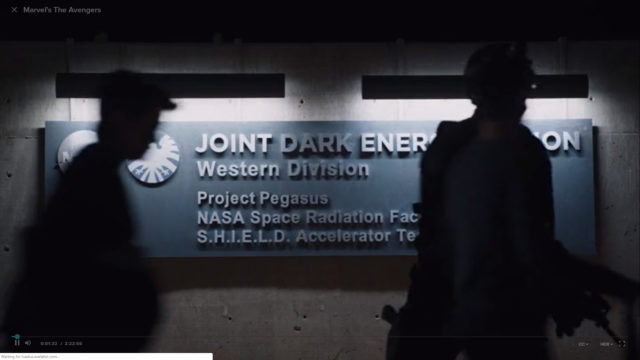
Given that it’s basically been printing money ever since, I’d say the gamble paid off rather handsomely for all involved. Okay, maybe not as much for Paramount, since they were basically bought out by Disney and didn’t have any involvement after this particular movie. More than just being successful, what is more amazing was that they made comic book movies legitimately good. For as much as I railed against The Incredible Hulk, it’s still better than a lot of the other films which came before it.
I remember watching this in the theaters. I don’t think I moved for the entire thing, and my friends and I started making plans for another showing the next day (because the next one available was sold out). From a pacing perspective, I think this movie is probably more tightly edited and laid out than any other of the Marvel Cinematic Universe movies. It weaves between the scenes and plot points effectively, and there’s no wasted space in building up the characters.
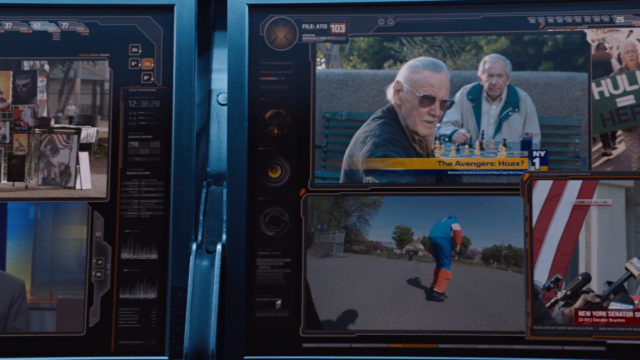
In particular, because it relies so much on the secondary characters, I love how much the introduction focuses on them. We don’t even see one of our title characters until Coulson goes and visits Tony, and his time as Iron Man is short. Well, sort of, we also get our new Hulk introduced with Black Widow in what starts a continual upward climb of tension that doesn’t end until it’s done.
That being said, one of the more annoying problems of Thor is back for this movie, all of the dark and underlit scenes. A huge amount of the start of the movie is in darkness. The underground stuff at Pegasus, the fight in Germany, and the whole first interaction between Loki and Thor on what I can only assume is one of the MCU’s weird random land masses in the middle of the Atlantic or magic floating glaciers that Cap crashed in to.
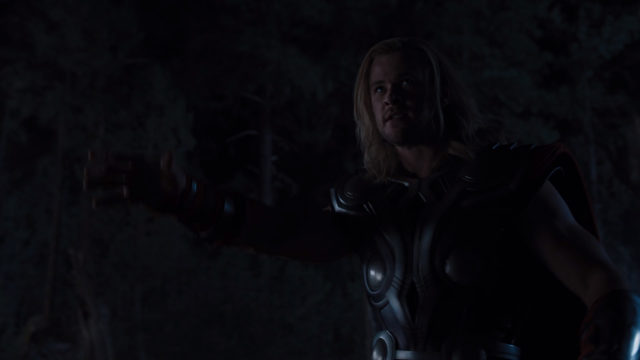
It eventually gets better, but the whole first act is like that, woefully underlit in a way that sort of diminishes the action. It’s really a shame, because the fight between Thor and Iron Man is actually pretty great (I especially like Thor headbutting Iron Man), it’s just so hard to see.
This movie is a bit unique, in that we only get one new character, Cobie Summers as Maria Hill. She’s a pretty solid casting, if lightly used… but I’m basing that mostly on her role in the comics than the role in the movie. While she becomes a lot more important in later movies, but here, mostly she’s in a support role.
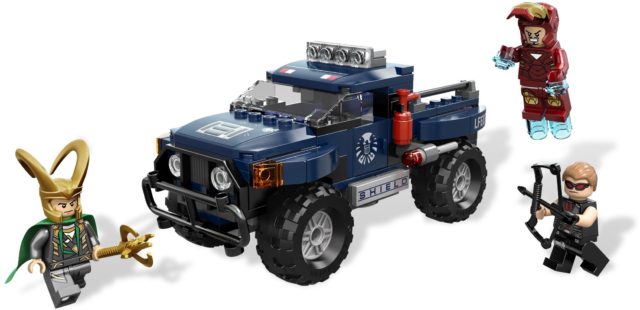
Avengers was also unique, in that it corresponded with the release of the Marvel Superheroes line that was tied to the Marvel Cinematic Universe movies. We got several sets that were inspired by the movie, and the first one was right at the introduction of the movie with the Loki’s Cosmic Cube Escape. As a set, not bad, though in hindsight, it should have included Maria Hill instead of Iron Man, but LEGO has never been been great about fitting the minifigs that make sense in a set. Also, why did they call it a cosmic cube… they would have known the name of the Tesseract long before that point, since it was revealed in First Avenger.
What Joss Whedon did so great as a director in this movie is ramping up the tension is such a realistic and believable way (in a risk of tipping my review hand, he failed at the same thing in Age of Ultron and in Justice League, so this is kind of the aberration when it comes to superhero movies). At some level, it is sort of contrived, playing out exactly the way an ensemble movie was going to and hitting all the tropes along the way.
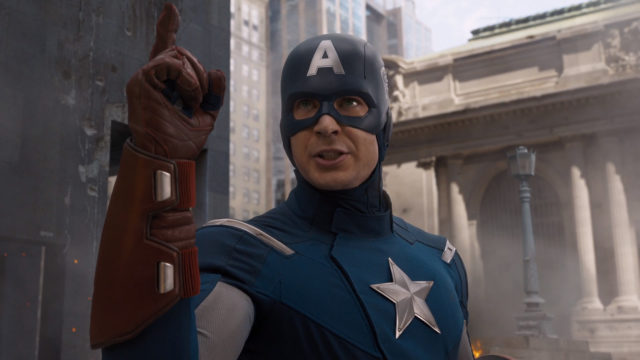
Tony isn’t a team player, Steve is the ultimate team player. Banner is a ticking time bomb, Fury is keeping secrets, Natasha is distracted by a missing friend. By itself it would make for a decent movie, but the genius here is that it works so much more when you’ve watched all the movies leading up to this and have a deeper understanding of the characters involved.
To contrast this with the DC movies that wanted to just jump right in to having a big team… Marvel spent five movies setting up to make the big “together” movie even better while DC tried to shortcut that and hope that everyone would remember the connecting bits from the comics. More than that… they focused on the big heroes alone, and didn’t bother with any of the secondary characters or connecting glue that really made it click.
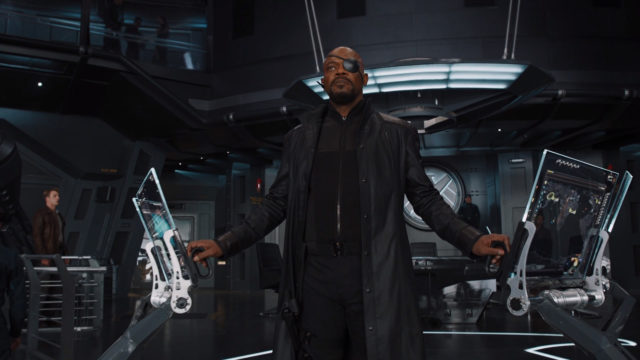
That is the strength of the MCU coming in to The Avengers that none of the other attempts at this have seemed to realize. It’s not just Thor and Captain America and Iron Man… it’s also Black Widow, Hawkeye, Pepper Potts, Peggy Carter, Nick Fury, and all the other characters that pull the movie together. You can watch this movie and still enjoy it without having seen any other movie, but it is so much better if you have watched one of them, and keeps improving the more of it that you have watched.
That is kind of the strange thing about this movie… it is in some ways very stock action movie, bringing the team together to get the big bad. Using Loki was smart here, even though it was a rehash villain, because we knew what his motivations were thanks to Thor. It also helped that he was also the original villain for the Avengers in the comics, playing off the history while building its own. It hits all the trope and doesn’t do a lot to surprise you…
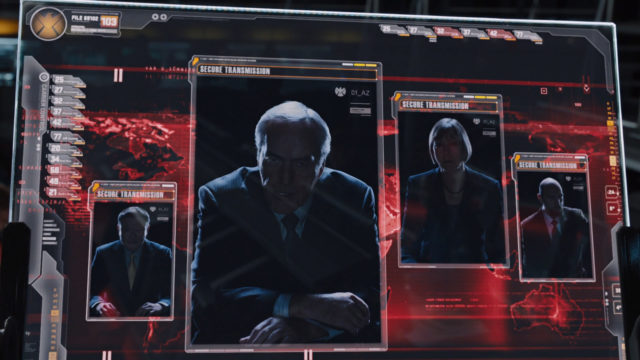
… but it just executes everything so damn well that you don’t care. It’s all leading up to the “team comes together” moment. Instead of trying to hide it and ease into it, the whole thing gets baked right into the plot. Fury knows that they need to come together and orchestrates everything to make it work. Everything in the movie seems to happen for a purpose without being filler.
Everything about the movie plays up the previous films, while bringing its own game to it as well. The three acts are a lot more woven together, starting with all of the things going sideways and bringing them together, then the Hulk breaking out of the Helicarrier (just not in a way the set shows), and after that the Battle for New York. While the past few movies have had their anti-climactic moment in the third act, that is most certainly not the case for the Avengers.
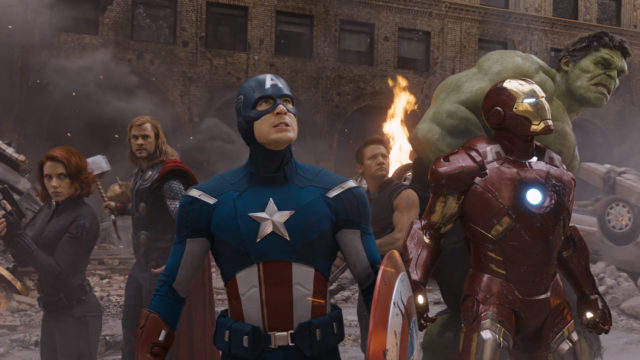
Once the battle starts, it is simply non-stop action that just flows so incredibly well, ramping up constantly. You know that they’re going to win, but the danger feels real (and you can never count out Whedon from offing someone, probably Hawkeye, just because he can; I know he doesn’t, but now we all assume Clint will die in every movie). It’s like when you order a dish that’s spicy, and it’s subtle at first, building with every bite, until you’re in a sweat but cannot stop eating.
One thing I noticed in the battle, more than any of the other Marvel movies, is how the music builds along with it. We’ve got little hints of the Avengers theme, but normally in the MCU movies, music has either been situational (Iron Man playing in… Iron Man, AC/DC, that sort of thing) or designed to fade directly into the background. For the first part of the movie, it does it here as well… but the moment the Avengers start to come together, we get the theme, soft at first and then building up a bit more each time. When they are controlling the fight, it’s triumphant, and when they are about to be overrun, it’s more subdued.
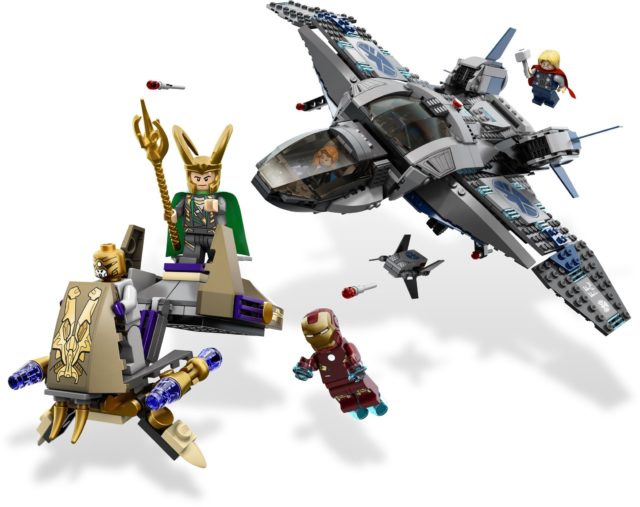
It was that moment when I heard the Avengers theme that I got goosebumps and realized that it entered that same lexicon as hearing the Darth Vader or Princess Leia theme in Star Wars, where you see it as much of a part of the characters as their look and behavior. I mean for all the ill the prequels get (much of it from me), when the music hit in there, it worked… I believed Anakin was Vader more in the theme than when he got the helmet. That same feeling here, as the theme plays, we know we have the Avengers.
All of the actors brought their A-game to this, old and new. You have to look at what Mark Ruffalo did as Bruce Banner and just see how much of an upgrade it was for the character. Edward Norton is a great actor, but I simply cannot picture him in the role at all, and that’s all on how Ruffalo did the work as Banner and bears out the look of Hulk.
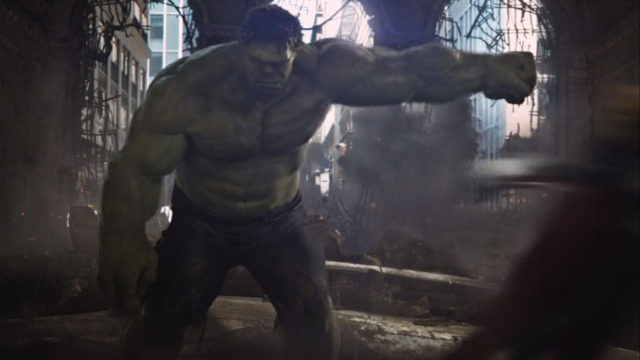
It’s in Robert Downey Jr., though, where the movie just peaks. The best scene in the whole movie is him, in Stark Tower, talking to Loki and explaining exactly what will happen. The cockiness of it, the confidence despite knowing they are against impossible odds… it’s just a delight to watch. Even when he has to take the silly moment and explain the Avengers thing to him, and hold back rolling his eyes over it, because on its face all the comic stuff is kind of silly… it just works.
I suppose there is a death in this movie, though, but it’s one that feeds into the story (well, there are hundreds, if not thousands, of deaths from the fighting). Pour Agent Coulson, getting a spear, serving as the catalyst for them coming together… and really getting the fans emotionally invested as well to what was going on. Most of us simply loved the character and how he fit into the whole of the setting as much as any of the other characters.
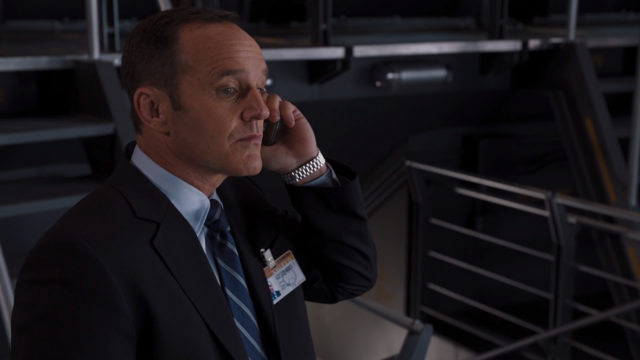
Of course, that is, in some ways, diminished by the fact that he is alive* again in Agents of SHIELD, but none of the Avengers know that. Here’s hoping that he somehow gets in there for Endgame, but who knows how that movie can end up going. I’ve been in total blackout for it since the second trailer (I haven’t watched anything I’ve posted on it since… my secret is out) and I’m trying to avoid even the rumors on it at this point.
That being said, he was simply fantastic in AoS and its worthy of a watch (right as you’re getting to Civil War Winter Soldier, if you’re watching through stuff). It starts out slow, but trust me when I say it gets so much better around midway through the first season. And there’s a moment where you’re going to come around to the lead character in season 2 that you will be jumping up from your chair and cheering for her.
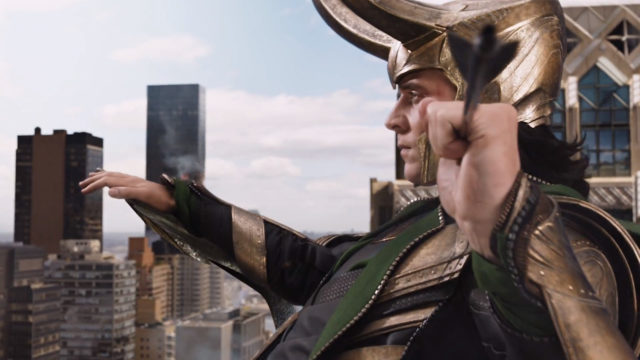
Once the battle is over, we get to see the “new normal” established for this universe as a whole. It’s not just superheroes fighting villains in the normal-ish world, we have aliens coming in through wormholes above New York. Taking away the stakes of our heroes being at risk, the stakes for everything that comes after this for the MCU has changed.
That’s a point that’s been a problem with all of the other properties that have tried to build up a collective universe in movies. They have to keep telling us, or adding things to show us, that the stakes have changed. It’s never something the audience gets to find on their own. The whole plot of Man of Steel is explaining how the stakes have changed, and then it has to keep showing that in Batman v Superman because he don’t have a baseline of what it was like before. In the shared Universal Monsters universe… actually, I don’t know what happens in that, because I, like basically everyone else in the world based on the box office numbers, didn’t watch them.
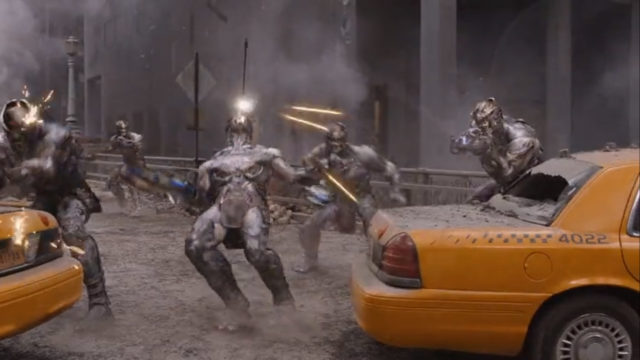
This is the movie that ends up through the rest of the MCU, and will have an outsized impact, both with the villain and heroes. Loki would go on to be a central figure for the Thor Movies and have an impact on several characters. Seeing the relationship that forms between Tony and Steve will shape, and tear apart, the rest of the universe. The connections and stories here will touch basically everything we see in the next seventeen films (kind of assuming Endgame can be tied to this).
I mean, we’ve known all along that aliens are out there in the universe… well, at least since Thor (but mostly because of course they are… these are comic book movies). The Chitauri were an interesting choice to bring into the movie, and Thor knew the name but not the source of them (how much influence the Asgardians really had was always… fuzzy), but not much else. In the comics, they’re basically a fusion of the Skrulls and the Brood, and weren’t that big of a force overall.
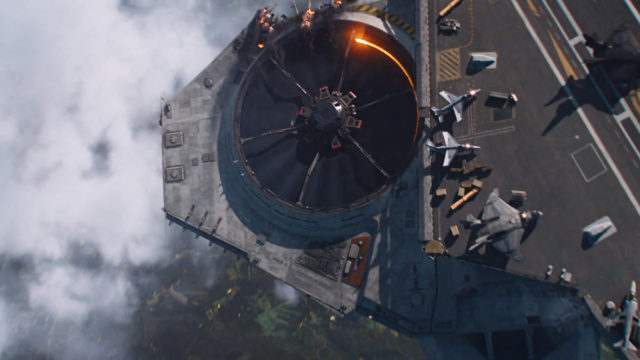
They are very humanoid, but frequently alien. I get, from a production point of view, the need to “human-up” aliens in sci-fi, fantasy, and comic stuff. Human actors are typically going to be cheaper than a lot of CGI, and audiences understand and accept them easier than coming up with something weird. As an evil force, they’re just alien enough, but more than that, attack in a very alien way that adds something to the whole battle that other movies lacked.
So, nerdy side discussion: based on the next two Thor movies and things we know about the scepter that Loki was using… was he just as brainwashed as the people he was using the scepter? He was most certainly the villain in this movie, but he seemed to be swinging from outright evil (when he eyeballs the scientist in Germany) to terrified and conflicted (fighting with Thor). We know that he was afraid of what was out there, and seemed in some ways coerced by what he was doing… but at the same time he just embraced it and seemed to actually want to rule Earth. Just something to mull over… I may be reading too much into it, but it felt like part of that thread was there in this story.
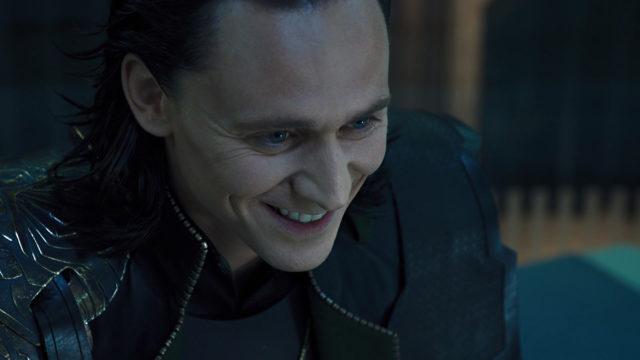
That this movie was such an effective payoff to four years of movies and an incredible coordination of stories and actors and directors is just an achievement in movie-making. The only movie series I can really think of which comes close would be Lord of the Rings, where they set out to make three interwoven movies and stories and pulled it off incredibly.
Sure, there are some things in the plot that make you scratch your head (why try to get an Infinity Stone by giving up another Infinity Stone – yes, I know, they didn’t know it was that until The Dark World, but the Chitauri did), but they’re mostly just nitpicking. This movie picked up the best things about the previous movie and dropped the rest: the irreverence of Tony Stark, the spectacle of Thor, the humor and action of Captain America, reducing the Incredible Hulk to a single line of dialog. It’s great on its own, but more than the sum of what came before it, and that’s great.
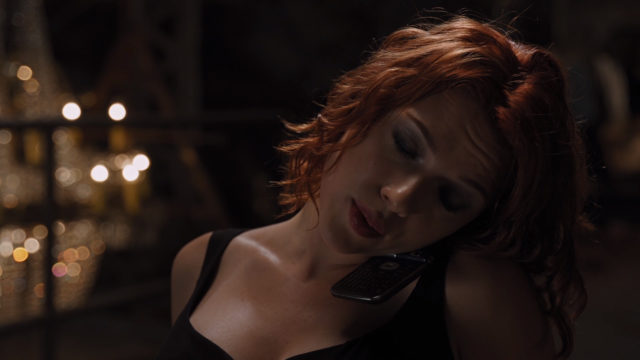
At the end of The Avengers, you’re left wanting more. The damage and destruction wasn’t undone, Loki was still alive and in custody, and the Avengers went in the wind. There were more movies in the future, but the story of Phase I was wrapped up, and there was so much ground that could be covered in the future movies. Of course, Phase II started with mostly sequels (one of which is probably the best movie that Marvel has made, in Civil War Winter Soldier), and we’ll talk about how it finishes up when we get to Age of Ultron, but the promise at this point is incredibly high.
The movie does not lay a lot of groundwork on where it’s going to go… except to give us a tease on a villain we aren’t going to see for years in a cameo (or for six years to see him as a proper villain). It was a brief tease, with no speaking, but seeing a grinning Thanos gave us what the setup was for the McGuffin we just saw, and would continue to get over the next seventeen movies.
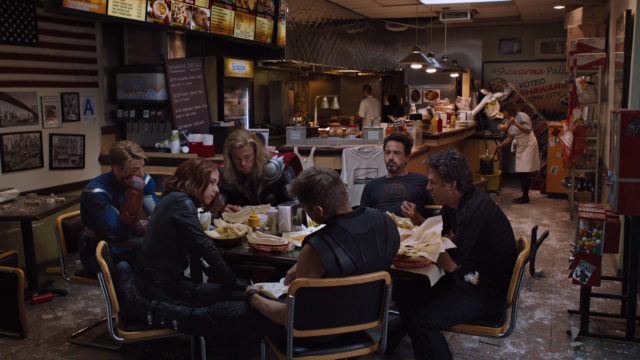
Fun story about the mid-credits scene in the movie. I’ve shared on FBTB before that my favorite comic series of all time is the Infinity Gauntlet (and that my favorite hero is Captain Marvel / Ms. Marvel… who has nothing to do with that story; she was fairly MIA for most of the 90s). When I saw Thanos in the mid-credits screen I stood up, pumped my fist in the air, and screamed. I was the only person in a half-full theater who even reacted to it. Yeah… my most nerdy moment as an adult by a wide margin I think.
The one thing that was introduced with The Avengers that has lasted through the majority of Marvel movies after it: the humor after credits scenes. Most movies end up with two after-credit scenes, with one being humorous and another meant to tie into something in the future. It isn’t a universal rule… Iron Man 3 only has one, as does Age of Ultron and later Infinity War. A couple won’t have humor (The Dark World or Winter Soldier), but most will. That it was kicked off by a last-minute add-on filmed after the premiere of the film shows you the effect it was going to have.
While Captain America: The First Avenger is my favorite of the Phase I movies, The Avengers is the best film of the bunch. It’s the best moving and tightly edited, with great writing and pacing, and the story that it tells has far outsize impact from its own story. Quite simply, it works, and it remains as entertaining after watching it a dozen or two times as it was the first time I saw it in the theaters. It is a solid five out of five and is one of the very best Marvel Cinematic Universe movie ever made.
Bonus Short Review: Item 47
Continuing the sorely missed One Shots is the one that sits out the weirdest of the collection, since it’s the only one that doesn’t include a main or major supporting characters… the only character of note is Jasper “How Does This Guy End Up Hydra” Sitwell, who had been a very background character in Thor and Avengers and the other half of the Coulson conversation in the first One Shot, the Consultant.
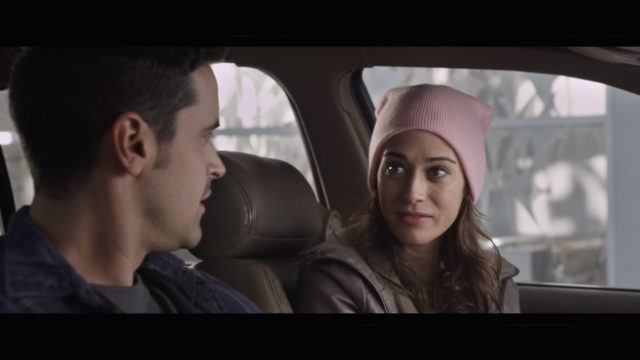
I mean, this isn’t bad, and a more interesting look at the S.H.I.E.L.D. recruiting process that we see play out many other places (they tend to recruit the people they are chasing, arresting, or fighting). The premise isn’t bad, and we’ll see it play out in a much bigger way in Spider-man: Homecoming, it’s just that the characters have so little connection. It’s not bad, it’s just not really all that important.
Review Summary
Since there are going to be a lot of these reviews, and it’s nice to see how all of the movies stack up against one another, we’re going to add a little summary section for the Marvel Cinematic movies. When we’re all done, I’ll have an article that goes over my rankings of all the movies (which won’t necessarily reflect the overall quality of the movie in stars, etc, more of how it ranks within the total collection).
- Iron Man (2008) – 5 out of 5
- The Incredible Hulk (2008) – 2 out of 5
- Iron Man 2 (2010) – 3 out of 5
- Thor (2011) – 3 out of 5
- Captain America: The First Avenger (2011) – 4 out of 5
- The Avengers (2012) – 5 out of 5
- Iron Man 3 (2013)
- Thor: The Dark World (2013)
- Captain America: The Winter Soldier (2014)
- Guardian’s of the Galaxy (2014)
- Avengers: Age of Ultron (2015)
- Ant-Man (2015)
- Captain America: Civil War (2016)
- Doctor Strange (2016)
- Guardians of the Galaxy Vol. 2 (2017)
- Spider-Man: Homecoming (2017)
- Thor: Ragnarok (2017)
- Black Panther (2018)
- Avengers: Infinity War (2018)
- Ant-Man and the Wasp (2018)
- Captain Marvel (2019)
- Avengers: Endgame (2019)
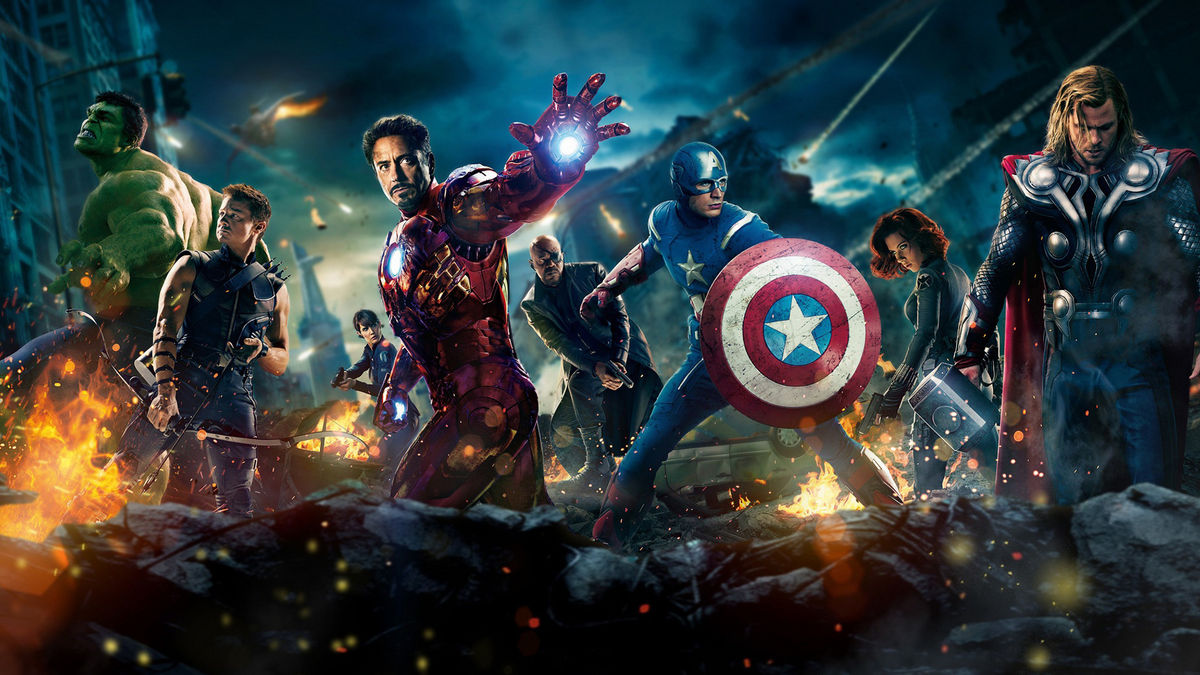
Leave a Reply